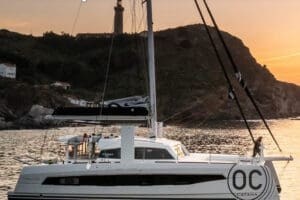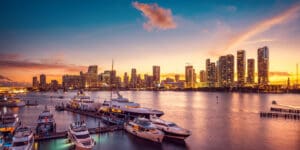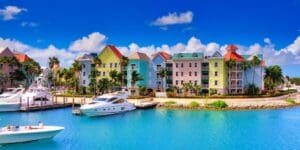Overseas Radio Network – Pets on Board & Port Transportation
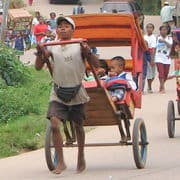 Topics in Overseas Radio Network Show 13, Segment 2:
Topics in Overseas Radio Network Show 13, Segment 2:
- Octo the Cat on board…and how he was trained for when he went overboard
- Pet laws in different countries
- How to get around on land – local taxis, buses, bikes
GARY FRETZ: Welcome back to our show. And I am Gary Fretz. And if you would like to read more about Stephen and Estelle’s adventures of sailing around the world just go to www.catamaranguru.com.
For a transcript of this podcast, click below.
Octo the Cat Trained to Be a Sailing Cat
Now in our last segment, we were talking about pets and how much fun they can be on a boat. And, Stephen, you had an experience with Octo the Cat. Can you talk about that?
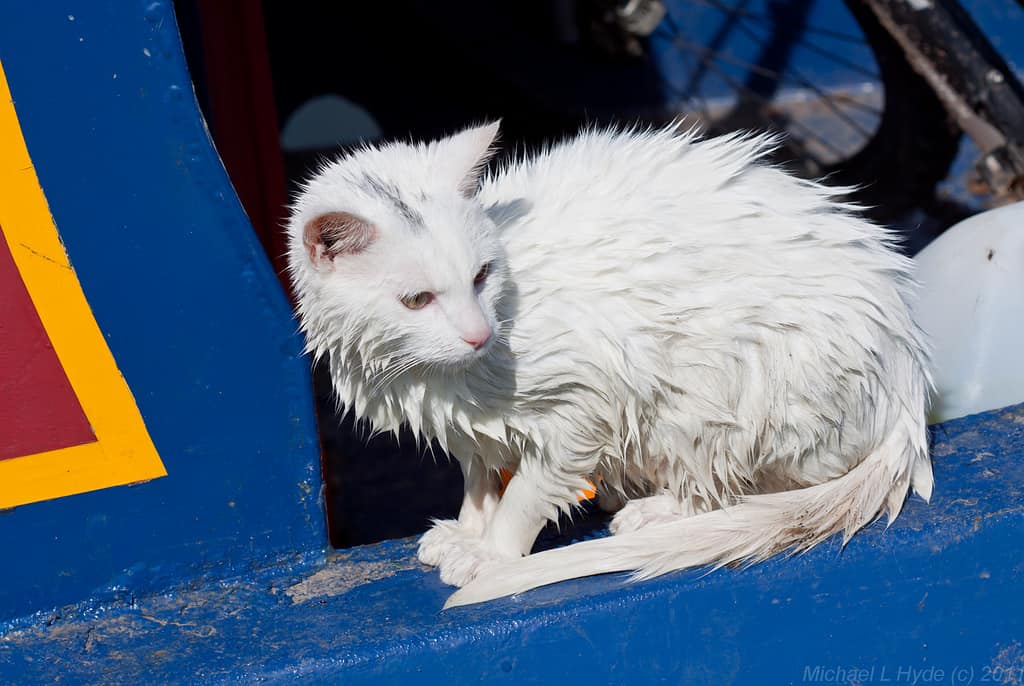 STEPHEN COCKCROFT: Yes, we met an Australian. His name was Ian, very nice fellow. Made his own boat in Australia and sailed a crossed the Indian Ocean. And we met in Madagascar and had this big old tabby cat called Octo. And Ian had a way of training his cats. He later got a little kitten and I was watching him trained that. And this little kitten and he would look on the side and he would walk up behind him with his toe and flip him over the side of the boat in the water. And I never could understand why these 2 large ropes were hanging from the stern of his boat and he trained his cats that if they hit the water, the first thing they had to do was figure out which way to swim and swim straight to these ropes. And, of course, cats have these sharp claws and they just climb the rope back on deck.
STEPHEN COCKCROFT: Yes, we met an Australian. His name was Ian, very nice fellow. Made his own boat in Australia and sailed a crossed the Indian Ocean. And we met in Madagascar and had this big old tabby cat called Octo. And Ian had a way of training his cats. He later got a little kitten and I was watching him trained that. And this little kitten and he would look on the side and he would walk up behind him with his toe and flip him over the side of the boat in the water. And I never could understand why these 2 large ropes were hanging from the stern of his boat and he trained his cats that if they hit the water, the first thing they had to do was figure out which way to swim and swim straight to these ropes. And, of course, cats have these sharp claws and they just climb the rope back on deck.
I thought that was absolutely smarter than anything. Anyway, he was telling me that one night he was in pretty bad weather. And Octo used to sit in the cockpit when he was in bad weather. It was night time. And he was sitting there, the next thing this wet animal from the deep launched himself into the cockpit. And what had happened is Octo had fallen overboard under sail. And this big strong cat had managed to get a claw into the rope, climb up, and leapt into the cockpit in the middle of the night.
He almost jumped over the other side but just shows you training and that and if course if that cat had missed that rope he probably would be dead because he wouldn’t have known he would have been overboard and gone.
Pet Laws in Foreign Countries
But anyway just one thing, always remember, that every country, you know, we had to swap Albert (our ape) for a rug. And we still have the rug, a very nice rug. And going to foreign countries, you always need to know if you have pets what their rules are.
Mostly ex-British Colonies always that very strict quarantine rules, etc. And so it’s just something that you really need to keep in mind.
GARY: Thank you for all that advice about pets. They sound like a fun thing to have on a boat. Now, you guys have travelled many, many miles. Like how many, in excess of how many miles have you travelled on a yacht?
STEPHEN: We’ve probably done about 40, 000 nautical miles.
Transportation While in Port
GARY: Wow, so okay. When you go to all these foreign ports, you obviously can’t carry your car with you. But you need to get around when you get to land. And so talk about how you do that.
STEPHEN: Well. I am going to share this to Estelle because, you know, this is a very broad subject, you know. The very first foreign country we ever arrived in was Madagascar. And there, it is a very poor country. And, you know, they have those little Renos with the gear shift that comes out of the dashboard. And they have these little rickshaw carts and they were called pousse-pousse.
GARY: Wait, wait we can’t talk about X-rated things on the show. You sure about that? [laughter]
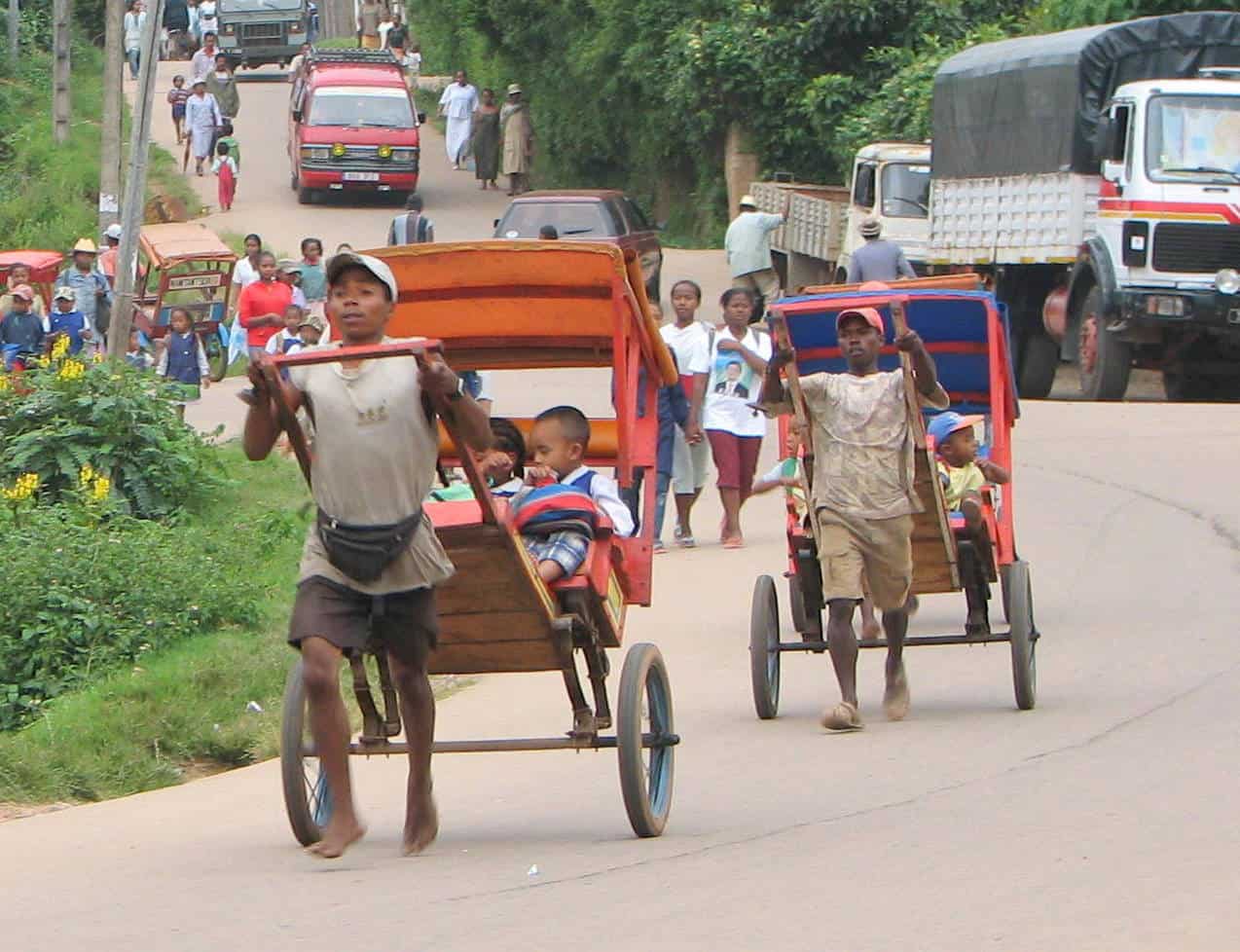 STEPHEN: That’s French. And it is called a pousse-pousse, maybe “push push”. But that’s what is was called and we and were as shocked as you are. So we would get in these little carts and you’d pay the equivalent of maybe 3 cents. And, then, this Malagasy fellow used to go running. And we’d say, “Okay, find me a bar,” and we’d get like four, one for each of our crew…we had 4 crew when we got to Madagascar. We would have these four little carts when we get to Madagascar running along pulling us, you know. I knew I got my money’s worth when I saw the sweat running down his back. That was the primary transport in the first place we got to when we left South Africa.
STEPHEN: That’s French. And it is called a pousse-pousse, maybe “push push”. But that’s what is was called and we and were as shocked as you are. So we would get in these little carts and you’d pay the equivalent of maybe 3 cents. And, then, this Malagasy fellow used to go running. And we’d say, “Okay, find me a bar,” and we’d get like four, one for each of our crew…we had 4 crew when we got to Madagascar. We would have these four little carts when we get to Madagascar running along pulling us, you know. I knew I got my money’s worth when I saw the sweat running down his back. That was the primary transport in the first place we got to when we left South Africa.
ESTELLE COCKCROFT: At first I felt really, really bad about these guys. You know, these skinny guys running around town with us white people sitting in the back of their cart. But we were told that we are creating employment and they feed their families and it is a good thing to do. And it is a tradition in their country.
Anyway, so we also had these guys pull our 44-gallon drums of diesel to the boat. Now, Stephen will have to tell that one.
STEPHEN: Well, it turns out it is not only people pousse-pousses, there’s also cargo pousse-pousses as well. And so we needed fuel for our boat. And so we went and we had to rent a 44-gallon drum. The we rented a little cargo pousse-pousse which we then jumped into a people pousse-pousses and we ran up to the gas station where we filled this thing with 44 gallons of diesel. And then the whole procession there proceeded down to the port. And that’s how we fuel the boat.
So Madagascar was a really interesting place, you know. There was pousse-pousses and Renos that was the sum total of it. We left Madagascar and sailed back to South Africa and got up to the African coast and made land fall in Kenya/ And in Kenya they have another form of transport which is Estelle is very, very an expert at.
ESTELLE: That was called the Matatu. It’s a mini-bus filled to capacity. And we literally, you couldn’t fit an ant into those taxis, as they call them. At one point, Stephen and I jumped on, of course, because that’s how you get to town. That’s how you get to the market. And they pushed us in with the rest of the guys as tight as you can possible imagine. And I thought I was going to faint this was just above everything.
STEPHEN: The Matatus are, I guess, in this country, in America, I guess, they would be like 15 or 20 seater busses. And they had stereo systems which I think they put generators on the roof. They made so much noise. You could hear them coming from about 2 miles away. So don’t even have to look down the road. You just sat there. When you heard this rap music, you knew that the bus was getting close. And when you jump on this, you had a guy which is like the conductor guy. And so you would get on the bus and he would literally full the thing up so tight.
If you were standing in the aisle way he would then come and ask you stagger. Because if you stagger, it’s like the bullets in the magazine of a gun so you could get more in. And then I have seen them come pass with the conductors hanging on to the side of the door, people literally lying on their chests. That’s how full these suckers are.
ESTELLE: Yeah, imagine coming back from town with all your shopping bags. It was a nightmare, but that’s how we got around. And after about 4 months in the country, I became an expert. I could squish myself in there with the best of them.
GARY: Very good, this sounds like some great tips. The last time I was out cruising for about six months and one thing I really like to have on the boat, which comes in extremely handy, are bikes, folding bicycles. They make these for yachts and they are made of materials that will not rust easily. But some of them are made in China and they don’t really, they are not really the highest of quality. But, anyway, folding bikes are a great thing to have on a boat. And we had lot of fun travelling around on folding bikes in the various places we went.
Now, when you guys get to a foreign port, how do you find like all the different markets and things? Because they are not right there but is that a problem?
STEPHEN: Well, you know, that reminds me of a story when I went to Germany. We were going to go to the Octoberfest and we were staying in some suburb. And me and my buddy and we didn’t know how to find the Oktoberfest. So we went down to the local station and we saw a German guy with leather pants on and a hat and his shaving brush in his hat and braces. And so we looked at each other and said this guy has got his drinking clothes on and so we just followed him. And, you know, he led us straight to the we went through 2 stations and a bus, etc. but we just…eventually the guy was getting quite self conscious because he thought we were following him…but we actually were and we actually found the beer gardens following the guy.
Anyway mostly when you get into the anchorages, you will find there are lots of cruisers that are there that have been there before you. And the tradition is, if you go to an anchorage and you knew the other people in the anchorage will come up with their dingy and say, “Hi.” They will generally give you the lay of the land. They will tell you where Customs is. They will tell you where the local market is, where the best bread is, where you can change money. So, again, you are back in the fraternity of cruisers who really do take care of their own. That’s a group that you can always rely on.
GARY: So only speaking English is not a problem. I mean, you guys can survive quite well just speaking English, right?
ESTELLE: Yeah, absolutely. And obviously we also learned the languages in the countries, you know, by pointing at things in the market. But, here we go, Gary, I think we are running out of time.
GARY: Okay, so we are running out of time for this segment and we are going to take a short break and we are going to be right back you are listening to “Yachts: The Perfect Escape Vehicle” only on the Overseas Radio Network.



